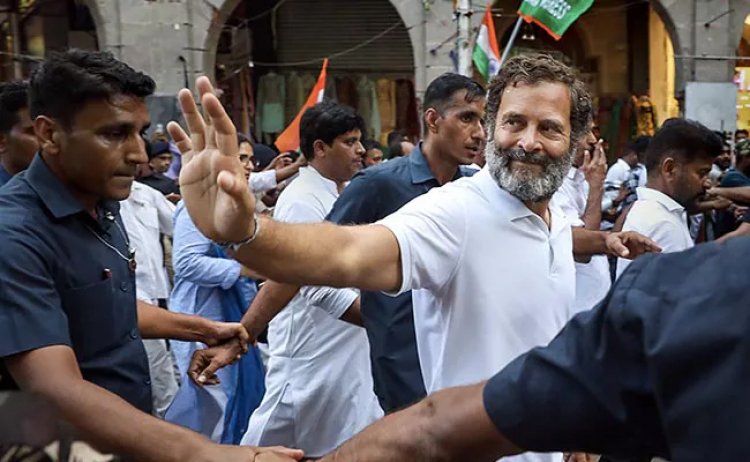Rahul Gandhi’s Unity March will Get More Goodwill than Votes
Asia News Agency

The ‘Bharat Jodo Yatra’ (Unity March), from Kanyakumari to Kashmir, is scheduled to pass through 12 States—spanning nearly 3,500 km in the course of about 150 days. The March entered Madhya Pradesh on November 20.
In a positive write-up, Amit Baruah (Resident Editor · The Hindu) states the March “is one of the most significant mass contact programs that India has seen in a long time. It is definitely the most important outreach that the Congress party has undertaken since it was comprehensively beaten by the Bharatiya Janata Party (BJP) in the 2014 Lok Sabha elections.
“Since September 7, the former Congress president has been walking and walking, chatting and smiling, addressing public meetings and engaging with people in a manner that is both rare and endearing for an Indian political leader.”
The March is not just aimed at the BJP, but its parent arm, the RSS too. ‘It [the ‘yatra’ or March] is a political action against the way the BJP and RSS are dividing the country and damaging the country by spreading hatred and violence,’ Gandhi has said.
Baruah says “at a time when large sections of the political class in India have bought into the majoritarian Hindutva project of the BJP-RSS, the former Congress president has had no hesitation in calling a spade a spade.” During the course of his March, Gandhi has repeatedly explained that the BJP spreads fear in the country and stated that his mass contact programme was aimed at combating this fear, violence and hate.
His political messaging is sharp and direct, but, argues Baruah “the Congress party’s dwindling political fortunes would indicate that the number of buyers for the messaging must increase and the party must win key elections if Mr. Gandhi is to keep his political ideology relevant in the country.
“The continuing stream of departures among MLAs across States would suggest that the challenge for the Congress to keep its flock together; it is something that Mr. Gandhi and the new Congress president, Mallikarjun Kharge, will have to contend with on a longer timeline.”
At the end of the day, Baruah states “the ‘Bharat Jodo Yatra’ will possibly earn Mr. Gandhi and his party more goodwill than votes. But if Mr. Gandhi is really keen to cleanse India’s political system of a Hindu majoritarian agenda, he will have to earn both.”
Strategy after the March
In the immediate future after the March, Shikha Mukherjee (senior journalist in Kolkata) writes "it is time, therefore, for the Congress Party and not just the Nehru-Gandhi family, to use its head and work to convert the goodwill and the support the ‘Bharat Jodo Yatra’ is building into votes and, more importantly, state Assembly and Lok Sabha seats.
The March “delivers a powerful visual message of the diversity and unity of the nation, which challenges because it contradicts the rigid division of Indians as either Hindu or non-Hindus…..It is therefore the responsibility of the Congress to make sure that the yatra is not a politically futile effort….”
The fancy notion, argues Mukherjee “that Mamata Banerjee and other smaller party leaders have that the BJP can be taken on separately in each state by regional parties fighting on their own is as vague as it is silly…..”
What an anti-BJP plan should be: The Gujarat Assembly election in December will make things clearer. The Congress and the Aam Aadmi Party are contesting against the BJP and against each other in the state. “That is not a winning strategy. It may well be that the Congress and AAP undercut votes in such a way that the BJP loses in Gujarat. But that will be a fluke rather than a sensible plan.
"It is simply not sufficient to leave things to chance; it is necessary to have a coalition, that is, a pooling together of strengths that eliminates or circumvents the weaknesses, constituency by constituency, state by state, of every anti-BJP Opposition party and candidate. It is equally imperative that every anti-BJP Opposition party, both separately and collectively, work to stitch together a bigger network of political parties. In other words, the anti-BJP Opposition needs to woo the tiny parties that represent one or more constituencies on their side, to prevent the BJP from using these parties that represent mostly sub-caste identities as vote multipliers.
“In the Hindi heartland, identity politics of the sub-caste kind is a reality. In the Northeast and in tribal areas across the country, there are nuances of identity and representation that have to be factored in for the Opposition to turn itself into a serious challenger to the BJP.”
Message of the March is too broad to make it meaningful in an election: However, Mukherjee concedes “the message of ‘Bharat Jodo’ is too broad to make it meaningful in an election. It is an overarching idea that challenges the hegemonistic Hindutva agenda of the Sangh Parivar and Prime Minister Narendra Modi. As powerful as the message is, it will not work in the context of an election.”
The March “is just the warm-up. It will have served its purpose by getting the Congress Party into shape. Getting Opposition politics into shape is the next step.”
















